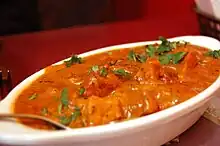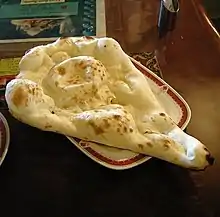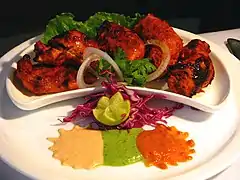Butter chicken
Butter chicken, traditionally known as murgh makhani (pronounced [mʊrɣ ˈməkʰaːni]), is an Indian dish originating in Delhi.[1][2] It is a type of curry made from chicken with a spiced tomato and butter (makhan) sauce. Its sauce is known for its rich texture. It is similar to chicken tikka masala, which uses a tomato paste.[6]
 Butter chicken | |
| Alternative names | Chicken makhani, murgh makhani |
|---|---|
| Course | Curry |
| Place of origin | India |
| Region or state | Delhi[1][2][3][4][5] |
| Associated cuisine | Indian |
| Created by | Kundan Lal Gujral and Kundan Lal Jaggi |
| Main ingredients | Butter, tomatoes, chicken |
| Variations | Paneer makhani, dal makhani |
History
The curry was developed at the Moti Mahal restaurant in the Daryaganj neighbourhood of Old Delhi in the 1950s, after the Partition of India[7] by Kundan Lal Jaggi and Kundan Lal Gujral,[8] who were both Punjabi migrants from Peshawar,[9][10][2] The curry was made "by chance" by mixing leftover tandoori chicken in a tomato gravy, rich in butter (makhan).[11] In 1974, a recipe was published for "Murgh makhanii (Tandoori chicken cooked in butter and tomato sauce)".
In 1975, the English phrase "butter chicken" curry first appeared in print, as a specialty of the house at Gaylord Indian restaurant in Manhattan.[12] In Toronto and the Caribbean, it can be found as a filling in pizza, poutine, wraps, roti, or rolls,[13] while in Australia, and New Zealand, it is also eaten as a pie filling.[14][15][16] The curry is common in India, Pakistan, and many other countries where a South Asian diaspora is present.[17][18][13][19][20] Due to its popularity outside of India, it is sometimes mistakenly believed to be of Western origin.[21]
Preparation
Chicken is marinated for several hours in a mixture of lemon juice, dahi (yogurt), Kashmiri red chili, salt, garam masala, ginger paste, and garlic paste.
The marinated chicken is cooked in a tandoor (traditional clay oven), but may be grilled, oven-roasted, or pan-fried. It is served in a mild curry sauce that includes butter. The sauce is a tomato, garlic, and ginger-based sauce that is simmered until smooth and much of the water has evaporated. There are many variations on the composition and spicing of the sauce, which is sieved so that it is velvety smooth. Spices may include cardamom, cumin, cloves, cinnamon, coriander, pepper, garam masala, and fenugreek (Punjabi/Hindi: kasuri methi). Cashew paste may be used as a thickener and it is finally garnished with coriander.
References
- Balasubramaniam, Chitra (August 10, 2017). "A palatial offering". The Hindu. Archived from the original on November 12, 2020. Retrieved November 9, 2022.
Go back in time to the place where butter chicken and dal makhni originated at Moti Mahal in Delhi's Daryaganj
- "Partition brought Moti Mahal, a landmark in India's culinary history, to central Delhi". www.sunday-guardian.com. Archived from the original on 11 June 2015. Retrieved 16 July 2018.
- Gujral, Monish (7 March 2013). On the Butter Chicken Trail: A Delhi Darbar Cookbook (1.0 ed.). Delhi, India: Penguin India. ISBN 9780143419860.
- Hosking, Richard (8 August 2006). Authenticity in the kitchen : proceedings of the Oxford Symposium on food and cookery 2005 (1 ed.). Blackawton: Prospect Books. p. 393. ISBN 9781903018477.
- "Hospitality Biz India :: ICC 2017 by IFCA - Showcasing the culinary spirit of IndiaKundan". www.hospitalitybizindia.com. Archived from the original on 2020-12-02. Retrieved 2018-02-10.
- Irwin, Heather (September 2019). "A Butter Chicken Vs. Tikka Masala Showdown at Cumin in Santa Rosa". Sonoma Magazine. SMI Media. Archived from the original on 12 April 2021. Retrieved 11 April 2021.
- "Butter chicken: A brief history". 11 April 2019. Archived from the original on 14 February 2021. Retrieved 7 February 2021.
- "Kundan Lal Gujral: Father of butter chicken". India Today. Archived from the original on 2021-10-07. Retrieved 2021-10-07.
- "'Vadiya Khao': Refugees taught Delhi how to eat out in style". Hindustan Times. 14 August 2017. Archived from the original on 15 July 2019. Retrieved 10 February 2018.
- "ICC 2017 by IFCA – Showcasing the culinary spirit of IndiaKundan". Hospitality Biz India. 11 October 2017. Archived from the original on 2 December 2020. Retrieved 10 February 2018.
- "What If Kundan Lal Hadn't Hit Upon Butter Chicken?". Outlook India. 14 August 2004. Archived from the original on 2 December 2020. Retrieved 16 July 2018.
- Shelhart, John D.; Cobleigh, Ira U.; Bacon, Norman (1975). "Manhattan Menus".
- Liu, Karon (13 August 2019). "How butter chicken roti became a Toronto classic". The Toronto Star. Archived from the original on 8 November 2020. Retrieved 4 January 2020.
- Saurine, Angela (26 May 2015). "The best pies in Sydney and regional NSW revealed". The Daily Telegraph. Archived from the original on 12 November 2017. Retrieved 6 April 2019.
- Broadfield, Rob (18 November 2017). "Rob Broadfield: Taste testing Mrs Mac's new Perth Stadium range of pies". The West Australian. Archived from the original on 9 November 2020. Retrieved 27 July 2018.
- "New vegan pie awards and the changing taste of a Kiwi classic". New Zealand Herald. 28 September 2018. Archived from the original on 25 August 2019. Retrieved 25 November 2019.
- Celjo, Farah; Hegarty, Siobhan (22 August 2018). "India's most popular curry: Butter chicken". SBS. Archived from the original on 6 February 2023. Retrieved 15 April 2019.
- "How Did Butter Chicken Become Synonymous With Delhi?". HuffPost India. 30 May 2017. Archived from the original on 15 April 2019. Retrieved 15 April 2019.
- Wilson, Laurie (11 August 2018). "What Is the Difference Between Authentic and American Indian Food?". Chowhound. Archived from the original on 30 October 2020. Retrieved 4 January 2020.
- Anand, Anjum (21 April 2010). "Sweet and murky: the British curry". The Guardian. Archived from the original on 11 November 2020. Retrieved 4 January 2020.
- Reinfrank, Alkira (26 May 2020). "What is butter chicken? Isn't it curry?". South China Morning Post. Archived from the original on 21 March 2023. Retrieved 24 May 2023.


